高中英语名词性从句典型错误例析
- 格式:pdf
- 大小:786.82 KB
- 文档页数:9
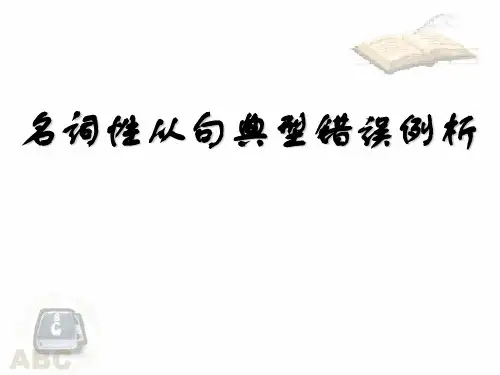
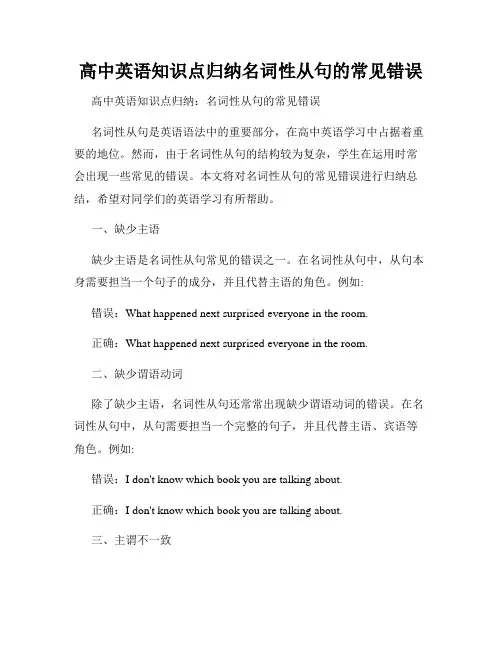
高中英语知识点归纳名词性从句的常见错误高中英语知识点归纳:名词性从句的常见错误名词性从句是英语语法中的重要部分,在高中英语学习中占据着重要的地位。
然而,由于名词性从句的结构较为复杂,学生在运用时常会出现一些常见的错误。
本文将对名词性从句的常见错误进行归纳总结,希望对同学们的英语学习有所帮助。
一、缺少主语缺少主语是名词性从句常见的错误之一。
在名词性从句中,从句本身需要担当一个句子的成分,并且代替主语的角色。
例如:错误:What happened next surprised everyone in the room.正确:What happened next surprised everyone in the room.二、缺少谓语动词除了缺少主语,名词性从句还常常出现缺少谓语动词的错误。
在名词性从句中,从句需要担当一个完整的句子,并且代替主语、宾语等角色。
例如:错误:I don't know which book you are talking about.正确:I don't know which book you are talking about.三、主谓不一致名词性从句的主谓一致也是容易出错的地方。
当从句作为主语出现时,需要与谓语动词保持一致,即使用单数或复数形式。
例如:错误:What interests me are the beautiful flowers in the garden.正确:What interests me is the beautiful flower in the garden.四、代词不一致在名词性从句中,代词的使用也经常引发错误。
当名词性从句中的代词与先行词不一致时,容易造成语义混淆。
例如:错误:My sister told me that she wants to study abroad.正确:My sister told me that she wants to study abroad.五、时态错误时态错误也是名词性从句中常见的错误之一。


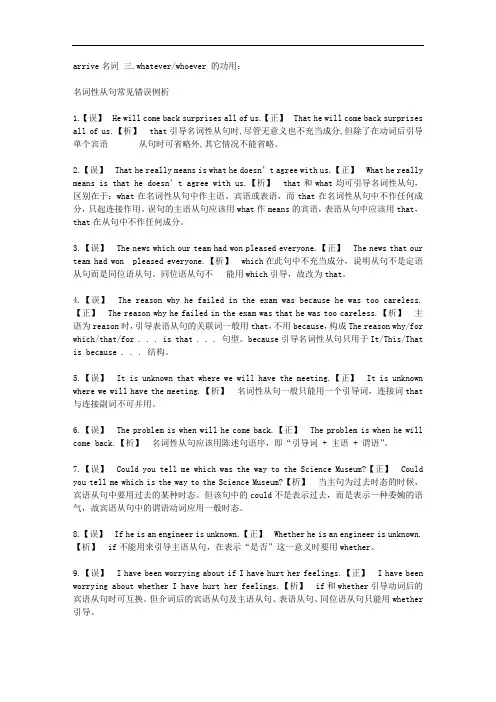
arrive名词三.whatever/whoever 的功用:名词性从句常见错误例析1.【误】 He will come back surprises all of us.【正】 That he will come back surprises all of us.【析】 that引导名词性从句时,尽管无意义也不充当成分,但除了在动词后引导单个宾语从句时可省略外,其它情况不能省略。
2.【误】 That he really means is what he doesn’t agree with us.【正】 What he really means is that he doesn’t agree with us.【析】 that和what均可引导名词性从句,区别在于:what在名词性从句中作主语、宾语或表语,而that在名词性从句中不作任何成分,只起连接作用。
误句的主语从句应该用what作means的宾语,表语从句中应该用that,that在从句中不作任何成分。
3.【误】 The news which our team had won pleased everyone.【正】 The news that our team had won pleased everyone.【析】 which在此句中不充当成分,说明从句不是定语从句而是同位语从句。
同位语从句不能用which引导,故改为that。
4.【误】 The reason why he failed in the exam was because he was too careless.【正】 The reason why he failed in the exam was that he was too careless.【析】主语为reason时,引导表语从句的关联词一般用that,不用because,构成The reason why/for which/that/for . . . is that . . . 句型。

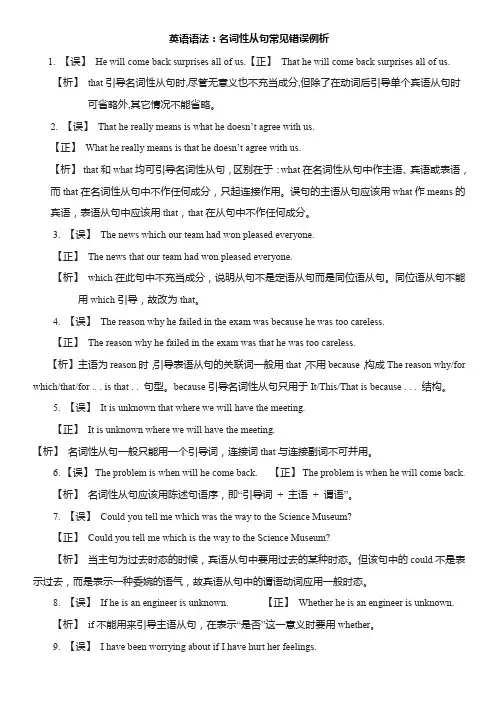
英语语法:名词性从句常见错误例析1. 【误】He will come back surprises all of us.【正】That he will come back surprises all of us.【析】that引导名词性从句时,尽管无意义也不充当成分,但除了在动词后引导单个宾语从句时可省略外,其它情况不能省略。
2. 【误】That he really means is what he doesn’t agree with us.【正】What he really means is that he doesn’t agree with us.【析】that和what均可引导名词性从句,区别在于:what在名词性从句中作主语、宾语或表语,而that在名词性从句中不作任何成分,只起连接作用。
误句的主语从句应该用what作means的宾语,表语从句中应该用that,that在从句中不作任何成分。
3. 【误】The news which our team had won pleased everyone.【正】The news that our team had won pleased everyone.【析】which在此句中不充当成分,说明从句不是定语从句而是同位语从句。
同位语从句不能用which引导,故改为that。
4. 【误】The reason why he failed in the exam was because he was too careless.【正】The reason why he failed in the exam was that he was too careless.【析】主语为reason时,引导表语从句的关联词一般用that,不用because,构成The reason why/for which/that/for .. . is that . . 句型。
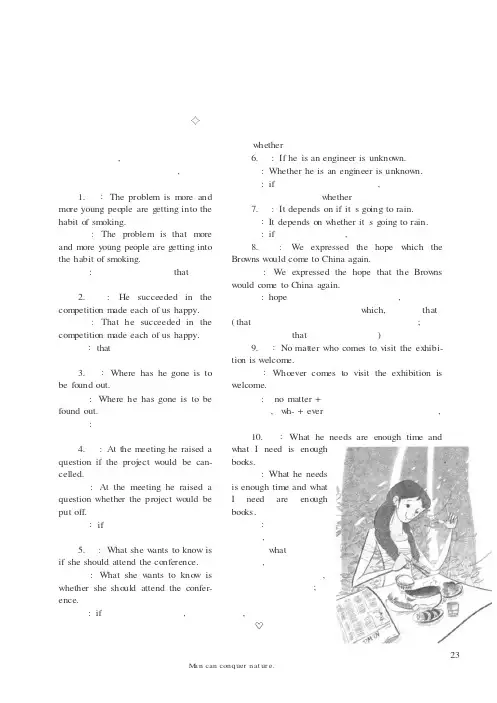
名词性从句是中学阶段必须掌握的语法内容,这里针对学生们常犯的错误进行如下归纳和分析,希望能对同学们有所帮助。
1.误:The problem is more and mo re young peo ple are g etting into the habit o f smoking.正:The problem is that more and more y oung people are g etting into the habit of smoking.析:引导表语从句的that在书面语中不可省略。
2.误:He succeeded in the competitio n made each of us happy.正:That he succeeded in the competitio n made each of us happy.析:that引导主语从句时不能省略。
3.误:Where has he gone is to be fo und out.正:Where he has gone is to be found out.析:名词性从句应该用陈述语序。
4.误:At the meeting he raised a question if the project w ould be can-celled.正:At the meeting he raised a question whether the project wo uld be put off.析:if不能用来引导同位语从句。
5.误:What she w ants to know is if she should attend the co nference.正:What she w ants to kno w is whether she sho uld attend the confer-ence.析:if不能引导表语从句,表示“是否”的意义引导表语从句的连结词要用w hether。

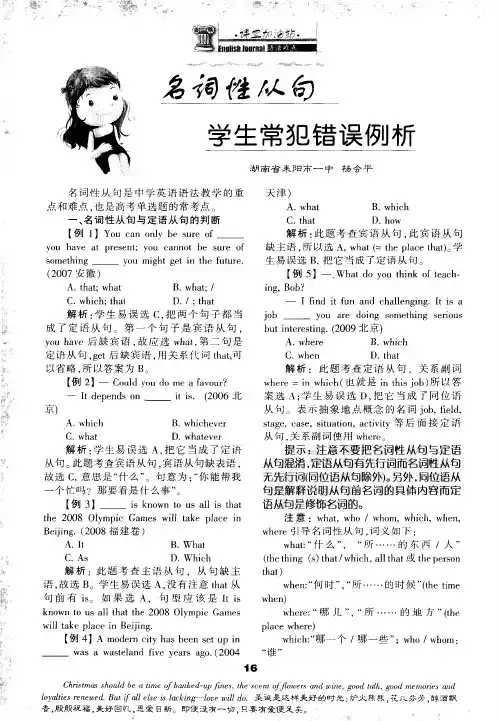
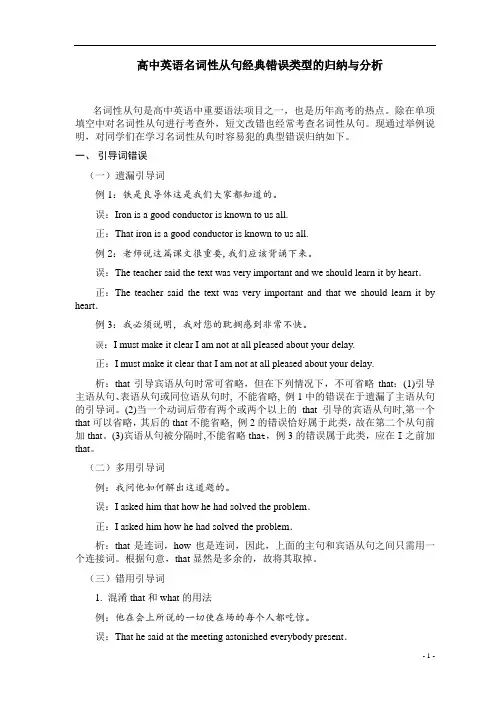
高中英语名词性从句经典错误类型的归纳与分析名词性从句是高中英语中重要语法项目之一,也是历年高考的热点。
除在单项填空中对名词性从句进行考查外,短文改错也经常考查名词性从句。
现通过举例说明,对同学们在学习名词性从句时容易犯的典型错误归纳如下。
一、引导词错误(一)遗漏引导词例1:铁是良导体这是我们大家都知道的。
误:Iron is a good conductor is known to us all.正:That iron is a good conductor is known to us all.例2:老师说这篇课文很重要,我们应该背诵下来。
误:The teacher said the text was very important and we should learn it by heart.正:The teacher said the text was very important and that we should learn it by heart.例3:我必须说明,我对您的耽搁感到非常不快。
误:I must make it clear I am not at all pleased about your delay.正:I must make it clear that I am not at all pleased about your delay.析:that引导宾语从句时常可省略,但在下列情况下,不可省略that:(1)引导主语从句、表语从句或同位语从句时, 不能省略, 例1中的错误在于遗漏了主语从句的引导词。
(2)当一个动词后带有两个或两个以上的that引导的宾语从句时,第一个that可以省略,其后的that不能省略, 例2的错误恰好属于此类,故在第二个从句前加that。
(3)宾语从句被分隔时,不能省略tha t,例3的错误属于此类,应在I之前加that。
(二)多用引导词例:我问他如何解出这道题的。
名词性从句中要注意的几个问题一.名词性从句中主句和从句的主谓一致、语序主语从句做主语相当于单数第三人称作主语,谓语动词用单数,如果由and连接两个或两个以上的主语从句做主语时,谓语动词用复数;由两个或多个连接词引导一个主语从句,谓语动词用单数。
如:When the meeting will begin has not been decided yet.When they will start and where they go have not been decided yet.名词性从句在句中要用陈述句语序。
如:He asked me what was the matterwith me.We’ve heard the news that well move into the new house.二.名词d eman d, suggest ion, proposa l, advice等词后的同位语从句的语气要用虚拟语气,结构为 should+ do, should可省略1.He gave me a suggest ion that I ( should) be calm now.2.The suggest ion that the plan (should) be delayed will be discuss ed tomorro w.三.whateve r/whoever的功用:Whateve r/whoever可引导主语,宾语,表语从句,并在从句中做主语,宾语,表语。
这种用法中,whateve r/whoever不含疑问意义。
Whateve r=anythin g that; whoever=anyonewho 1. Whoever breaksthe law is to be punishe d.Anyonewho breaksthe law is to be punishe d.2. They will do whateve r he wants them to do.They will do anythin g that he wants them to do.疑问词 + ever和no matter+ 疑问词的区别:①疑问词 + ever可引导名词性从句,在主从句中要充当一定的成分。